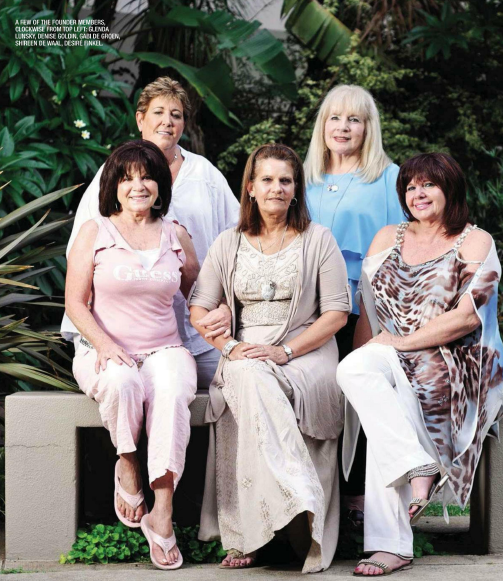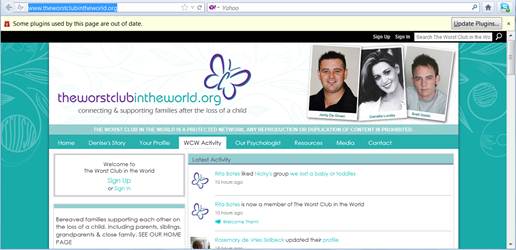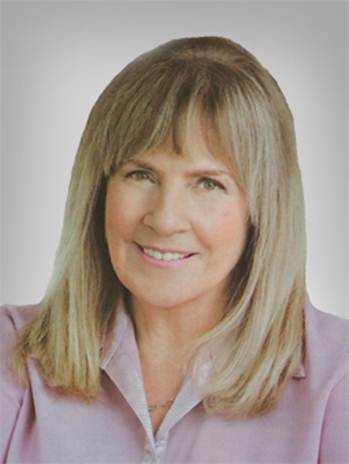You don’t ever want to join this club. But if you have
to the other members will be your salvation.
They don’t have a headquarters, a flag or a manifesto.
There’s no one calling the shots, not even a president or vice-president. There
are no membership fees, and why should there be, for a group that doesn’t
conduct meetings. Months can go by before some members see each other, while
others are in constant, sometimes daily, contact.

The members of the
Worst club in the World
The members of the Worst club in the World, as this group of
parents have dubbed themselves, all have one thing in common – the death of a
child.
Each situation is different. But whether the loss was due to
accident, illness, suicide, substance abuse, violent murder, miscarriage or
stillbirth, the grief is enormous, overwhelming, and affects the entire family.
The Club is very informal, explains Denise Goldin, whose
actor son, Brett (along with his friend, Richard Bloom) was kidnapped, hijacked
and shot execution-style in the back of the head in Cape Town on 16 April 2006.
‘it’s a name that we attached to a few of us who are close enough to be able to
share whatever we’ve feeling 24/7.’
Not a day goes by that Denise doesn’t think of Brett. There are
photos of him all over her Sandton house –daily reminders of her loss, but also
of how far she’s come since that horrific April day when he didn’t arrive at
their prearranged brunch.
Brett’s murder, just before he was due to head to the UK to
act in a production of Hamlet, made international headlines. What wasn’t
reported was the fact that 2006 was a triple whammy for Denise: just three
months after his death she was diagnosed with breast cancer – striggered, says
her surgeon, by her intense grief. A few months later her husband Peter
suffered a fatal heart attack at the gym, so Denise’s whole world was turned
upside down in the space of less than a year. You have to wonder how it didn’t
cripple her.
Denise’s turning point was the day Sharon Matthews, whose
daughter Leigh had been kidnapped and murdered in July 2004, came to visit her.
‘She held her arms open to me and no words needed to pass
between us,’ says Denise. ‘I knew she understood.’
Four months after Brett died, Denise found herself in a
stranger’s home for the first time, offering support. ‘I wanted to give back
some of the goodness that had been given to me,’ Denise explains. Paying it
forward has now become a way of life, and though she’s quick to point out that
she’s not a trained counselor, she knows first-hand the benefits of talking
through your grief with someone who can identify, exactly, with what you’re
experiencing.

website
theworstclubintheworld.org
Over the years since Brett’s death, Denise has visited over
40 families, giving a shoulder to cry on, even fielding middle-of-the-night
phone calls. If there were a leader of the Club, it would be Denise. She is
also the driving force behind the club’s next evolution: its online initiative.
She is funding the non-profit website theworstclubintheworld.org, a virtual
meeting place where families all over the world can support one another after
their devastating, inconceivable loss.
We all grieve differently, and part of what the website does
is guide the whole family through that process – not just the mother. Often,
Denise says, the father’s grief gets internalized while he tries to support the
mom, but the cracks eventually start to emerge – he might spend more time at
the office, in bars, or away from home, which could lead to his wife thinking
he doesn’t care.

Denise Goldin,
founder of the "Worst Club in the World"
It’s also a dual blow for the grandparents, who have to cope
with losing a beloved grandchild as well as seeing their own child suffer
enormously. But it’s the siblings who often get the worst of it, Denise feels –
they might have survivor guilt, and they often end up parenting their parents
to the point that their own sorrow and their problems take a backseat.
The website provides an outlet for all members of the
family, and contains discussion groups, forums, blogs for writing memories and
posting photographs, and survival tips for other families reeling in grief.
‘Online’ means there’s no geographical graphical gap between mourners. No
matter where they are real people with a shared debilitating experience who are
comforting each other. And, where professional counseling is needed, members
area able to interact with psychologist Dr. Jeanie Cave.
‘It’s as user-friendly as Facebook, and there’s a strong
feeling of community,’ Denise says. ‘It’s an excellent forum for people to
exchange stories, feelings, suggestions and advice, and to establish new
friendships. It’s also ideal for people who are isolated, or not ready to let
their feelings be known: for those who carry this burden of grief around with
them without any support or release. If you want to get fully involved, that’s
encouraged too.’
Behind her genuinely warm smile and huge heart, Denise is a
woman whose selflessness knows no bounds; the many harrowing tales she hears
don’t destroy her faith in people, they just make her want to make it all
better. Denise is proud of The Worst Club in the World’s new ‘baby’, their
website, but she also feels a sense of relief: the club provides a haven in
cyberspace, and it also means many more people can now be reached.
Managing grief
It’s perfectly okay to weep and feel so angry that you could
scream, throw something at the wall or punch your pillow. Even staying in bed
or at home for the whole day is part of a person’s grieving process. But
endless moping and shutting yourself away won’t help resolve this painful
situation.
Here’s some advice from Worst Club in the World members on
how to cope with losing a loved one:
·
If you feel you are slipping into a dark hole, don’t be alone.
You need to talk to someone and know that you are not alone in your grief and
pain. Get on the phone; call a family member, friend or even a helpline; go out
and visit someone, and spend some time on theworstclubintheworld.org.
·
Try not to come home to an empty house. If you have to, then make
sure there’s some background noise. A radio talk show is ideal ‘mental
popcorn’.
·
Read a magazine or an inspirational self-help book.
·
Meditation and visualization work wonders, as does exercise –
even the simple act of taking the dog for a walk.
·
Do something to honour and commemorate your loved one’s memory:
plant a tree in a public place, donate a bench with their name on it to a park,
school or a place they liked visiting. You could also donate a trophy for
prizegiving at the school they attended.
·
Don’t be afraid to seek professional help. This is a much safer
option than just taking prescription medication to numb the pain.